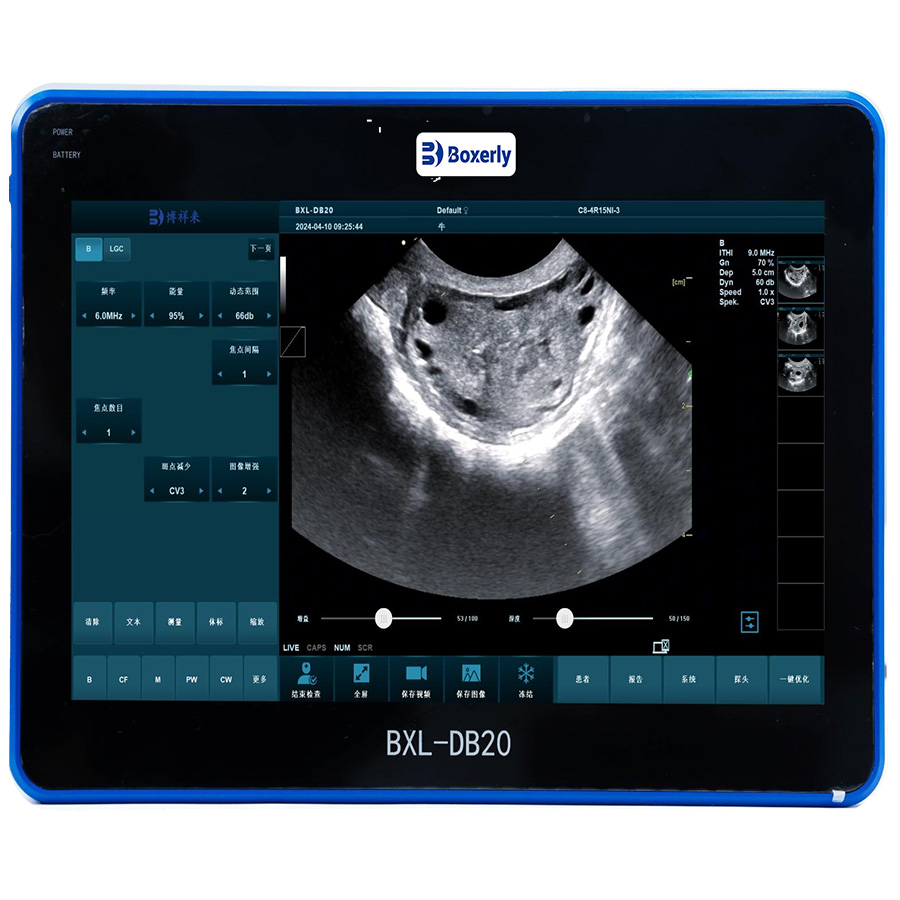A Veterinary ultrasound machine is a crucial tool for modern veterinarians, offering non-invasive diagnostic imaging for a wide range of animals. From confirming pregnancies to diagnosing internal injuries, ultrasound technology has become a staple in veterinary practices. In this article, we’ll explore what a veterinary ultrasound machine is, its key uses, and how to choose the best machine for your clinic or animal care facility.

What Is a Veterinary Ultrasound Machine?
A veterinary ultrasound machine uses high-frequency sound waves to create images of internal organs and tissues in animals. The machine sends sound waves through a probe, which then reflects off tissues and organs. The reflections are used to generate real-time images on a display, allowing vets to examine soft tissues, organs, and developing fetuses without invasive procedures.
Ultrasound is often preferred for diagnosing conditions that X-rays might miss, especially when imaging soft tissues like muscles, tendons, and abdominal organs.
Key Uses of a Veterinary Ultrasound Machine
Veterinary ultrasound machines are versatile tools that have applications across many fields of animal medicine, including:
1. Pregnancy Diagnosis
One of the most common uses of a veterinary ultrasound machine is confirming pregnancies in animals. Ultrasound allows vets to detect pregnancy early, monitor fetal development, and check for multiple pregnancies in species like dogs, cats, horses, and livestock.
2. Soft Tissue Examination
Ultrasound machines are particularly useful for imaging soft tissues such as muscles, tendons, and ligaments. They allow veterinarians to detect tears, strains, or other injuries in these tissues, which is especially useful in equine medicine and for diagnosing joint injuries in dogs and cats.
3. Internal Organ Imaging
Veterinary ultrasound machines are ideal for examining internal organs, such as the liver, kidneys, spleen, and heart. Ultrasound helps detect abnormalities like tumors, cysts, and infections, providing real-time images that aid in diagnosis and treatment planning.
4. Cardiology (Echocardiography)
Ultrasound machines equipped with Doppler technology are often used in veterinary cardiology. Echocardiography allows veterinarians to examine the structure and function of the heart, helping diagnose heart disease and monitor blood flow in real time.
5. Guided Procedures
Ultrasound technology can guide certain procedures, such as biopsies or fluid drainage, ensuring accuracy and minimizing risk for the animal.
Benefits of Using a Veterinary Ultrasound Machine
Veterinary ultrasound machines offer numerous benefits for both veterinarians and their patients, including:
1. Non-Invasive Imaging
Ultrasound technology is non-invasive, meaning it does not require surgery or sedation for most procedures. This is particularly beneficial for animals that may be stressed or fragile, as it allows for comfortable and quick assessments.
2. Real-Time Results
Ultrasound provides real-time imaging, allowing veterinarians to make immediate decisions based on what they see. This is essential for emergency cases or when fast diagnosis and treatment are needed.
3. Versatility
Ultrasound machines can be used across various animal species, from small pets like dogs and cats to larger animals such as horses and cattle. The same machine can often be equipped with different probes or transducers to suit various diagnostic needs.
4. Portable Options
Many modern veterinary ultrasound machines are portable, allowing veterinarians to take the technology into the field or perform diagnostics on-site at farms or animal shelters. This mobility is particularly important for large animal vets who may need to travel to remote locations.
How to Choose the Right Veterinary Ultrasound Machine
Selecting the right veterinary ultrasound machine for your practice depends on several factors, including the types of animals you treat, your budget, and the specific diagnostic needs of your clinic. Here are some key features to consider:
1. Image Quality
High-resolution imaging is critical for making accurate diagnoses. Look for machines that offer clear, detailed images and have features for adjusting contrast, brightness, and depth to suit different cases.
2. Transducer Options
Different transducers (or probes) are required for different diagnostic purposes. For example, a linear probe is often used for surface imaging, while a convex or sector probe is used for deeper organ examination. Make sure the machine you choose supports multiple types of transducers to accommodate a range of diagnostic needs.
3. Portability
If you’re a mobile veterinarian or treat large animals like horses and cattle, a portable veterinary ultrasound machine is essential. Portable machines are lightweight, easy to transport, and often come with battery-powered options for use in the field.
4. Doppler Capabilities
For veterinarians who perform cardiac diagnostics, Doppler technology is crucial for measuring blood flow and assessing heart health. Machines with Doppler capabilities are often used for echocardiography, making them essential for practices that deal with cardiology cases.
5. Ease of Use
An ultrasound machine should be user-friendly, with an intuitive interface and simple controls. Veterinarians often need to use the machine quickly, so ease of use is a top priority, especially for those who may not have extensive training in ultrasound technology.
6. Budget
Veterinary ultrasound machines vary widely in price depending on their features and capabilities. While basic machines may cost a few thousand dollars, more advanced models with Doppler capabilities and superior imaging can be significantly more expensive. Consider your practice's needs and balance cost with the necessary features.
Conclusion
A veterinary ultrasound machine is a must-have for modern veterinary practices, enabling accurate and non-invasive diagnosis of a wide range of conditions in animals. Whether you need to confirm pregnancies, diagnose internal issues, or perform cardiac assessments, an ultrasound machine can enhance the quality of care you provide.
When choosing a veterinary ultrasound machine, consider factors such as image quality, transducer options, portability, and budget to ensure you select the best machine for your clinic’s needs. With the right ultrasound equipment, you’ll be better equipped to make faster, more accurate diagnoses and improve animal health outcomes.
link: https://www.bxlimage.com/nw/856.html
tags: portable ultrasound machine price ultrasound machine cost portable ultrasound price veterinary ultrasound machine price medical ultrasound machine price





